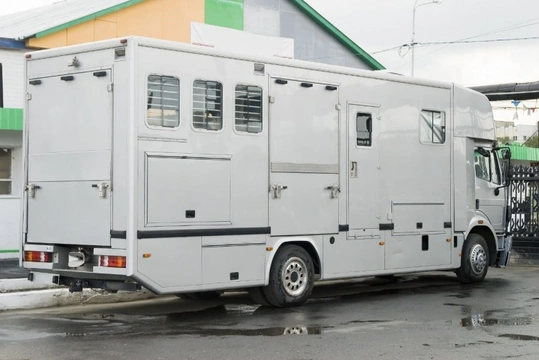Pets
Pets for studWanted petsBreedersAccessories & services
Knowledge hub
Support
Support & safety portal
Essential Emergency Kit Requirements When You Travel Your Horse
The biggest fear for most people when they travel a horse in a trailer or a lorry is a breakdown or an accident. It makes sense to carry some emergency equipment which could prove invaluable in making a running repair so you can continue your journey or keep you safe until help arrives. Here are some key items.
A torch or flash lamp, preferably one which has a handle which converts into a stand so it can be placed on the ground or a surface
A yellow flashing light which has a sticky base and can be used to highlight your location or warn other road users
A red warning triangle which can be placed in the road further away from the accident or breakdown to act as a warning
Hi-vis fluorescent jackets and tabards to keep driver and passengers visible when they are outside the vehicle
A selection of elasticated bungees of different lengths which can be helpful in securing lorry or trailer parts which have broken to make a running repair so you can continue your journey
If you have one of the newer style trailers then always have the Alun key available, the device which allows you to drop the trailer breast bars from outside the trailer if the horse becomes caught or trapped
Gorilla tape or equivalent which can be used to make temporary repairs to external doors or lockers and which can allow you to continue your journey
A sharp knife or scissors
A hammer which can be useful for shifting stubborn trailer pins
Always make sure you have sufficient hay and water for your equine passengers to keep them fed and hydrated in the event of a delay or breakdown especially on the journey home
A couple of spare lunge lines which can have a multitude of uses particularly if you need to unload a sharp or worried horse in a difficult situation
Check your emergency kit regularly particularly the batteries which can run down over the winter. Replace any items which break or wear out.
What should you do if you breakdown or are involved in an accident?
The first thing to do is make sure people are safe and this usually involves removing them from the vehicle to safe distance if possible but this will depend on the location.
Alert emergency services and recovery and then make the area safe if you can.
Horses are always best left on the vehicle if it has not been damaged and they will stand without injuring themselves. Offering feed can help distract them. Removing horses from transport will usually involve closing the road and so the police will be reluctant to do this – it is often safest to leave them where they are.
Remove any rugs if you think the horse will overheat.
If you do need to unload then put on a bridle with a headcollar over the top and use a lunge line then if the horse panics and pulls away, you should still have control.
A burst tyre or puncture can be changed with horses still on board if they will tolerate the noise.
Breakdown insurance
Breakdown insurance is an essential alongside your vehicle policy, it usually costs under £200 for the year. Breakdown insurance will recover your horse and your vehicle separately – a broken down lorry cannot be recovered with horses still on it. It is very expensive to send out a lorry to pick up a horse, a cost you will have to meet yourself if you are not insured. Some people rely on friends but this is not always an option if you regularly travel further afield.
It is a legal requirement to always travel your horse with their passport and you may be required to produce this when a recovery vehicle is sent out.
First Aid Kits
Keep a first aid kit on board for both horses and people, it can be useful to deal with minor injuries at an event and provide some emergency first aid in the event of an accident whilst you wait for help to arrive.
Emergency Services
When you phone the emergency services, advise the call handler what you may need. Police will attend to keep the area safe and organise traffic but you could require the help of a vet if a horse has been injured. A trapped animal may require sedation to be safely freed and the fire brigade might be necessary as well to help remove the horse from the lorry or trailer if they have to be cut out.
The emergency services are experienced and professional and many fire services are trained in horse handling and recovery so they have established protocols for use in equine situations. The main thing is to try and remain calm as your horses will take their lead from the people that usually handle them.



